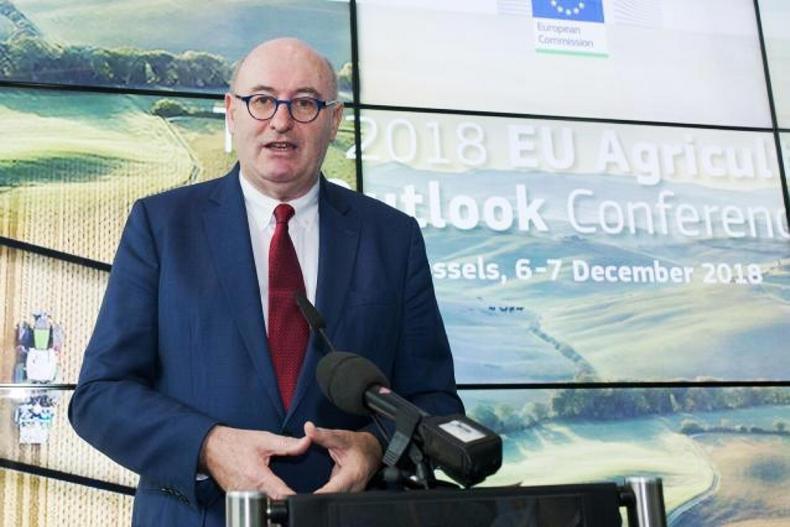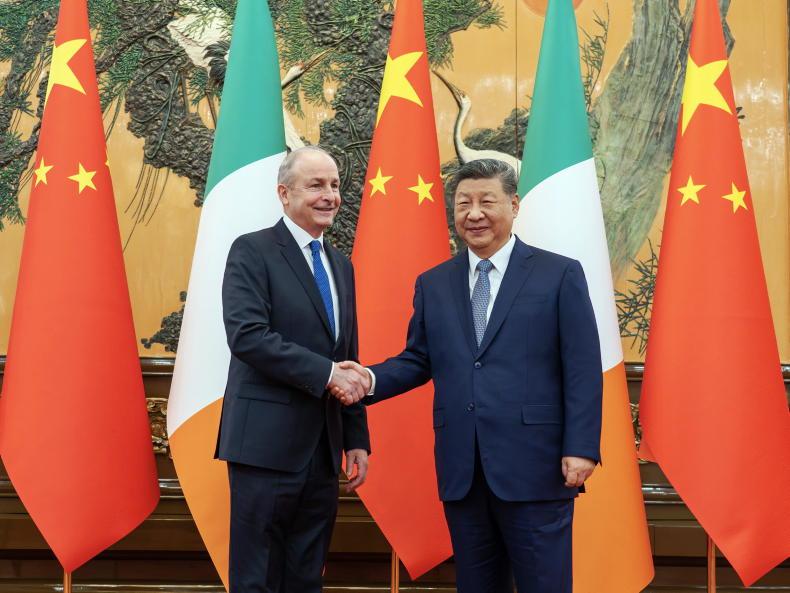Speaking at the Irish Farmers’ Association (IFA) Kilkenny dinner last weekend, the EU Agriculture Commissioner Phil Hogan was frank in saying that “we have to prepare for the worst” and that “the European Union stands ready to help Irish and EU farmers in the event of a hard Brexit.” This will be of some comfort to farmers following the revelation by the Irish Farmers Journal of how severe the impact of a no-deal Brexit could be if there were no measures in place to support the market, but we need to examine what they would mean in practice.
Scale of response
If the worst happens with Brexit, an immediate and powerful response will be required through a joint effort by the EU and national Government. As the Commissioner said, the EU has a selection of tools that can be used and reference is made to the most recent example of the Russian market closing which impacted particularly on dairy and pigmeat and slightly less so on beef.
In response to market collapse in 2015, the Commission introduced intervention buying for milk powder and an aid to private storage scheme for pigmeat.
The purpose of these actions was to remove surplus product that was created with the closure of the Russian market and put a floor on prices.
When the market stabilised, the EU began the process of selling the powder back on to the open market, with the last of the powder in store being sold at the end of last year.
On the pigmeat private storage scheme, individual businesses retained ownership of the product but received a payment to assist with storage costs for a period, but the companies were responsible for finding a market for the product themselves.
Contribution to market recovery
It is fair to say that dairy and pigmeat markets recovered from the Russian ban (though pigmeat has since fallen back) and the EU support mechanisms played their part. The difficulty is of course that a no-deal Brexit would present an unprecedented difficulty for agriculture in general but especially for marketing beef.
A possible parallel was the impact of the BSE export ban on Northern Ireland back in 1996 when export markets were closed overnight.
That created six months of turmoil until a purchase for destruction scheme was introduced for cattle over 30 months and intervention buying of beef for young cattle allowed trade to commence again though very different from what had been in place before. Looking at the risk of a no-deal Brexit is something that won’t have appeared overnight like the BSE ban did in the North. Both the Minister for Agriculture and EU Agriculture Commissioner have refused to divulge details of any plans they have to address whatever fallout that emerged from a no-deal Brexit.
When approached by the Irish Farmers Journal in Brussels this week a spokesman for the Commissioner, who was travelling in Egypt, explained that the Commissioner was well aware that while Brexit would impact all member states, none would be more affected than Ireland, farmers and agri food in particular.
He also referred to the past experiences of BSE and the Russian ban as evidence of the commission’s experience in dealing with severe market disturbance.
Tools available to the EU for market support
In Kilkenny, the Commissioner referred to the three core tools at the EU’s disposal for market support to deal with what the EU describes as catastrophic or systemic risks and a no-deal Brexit would certainly fall into this category.
These are Aid to Private Storage, intervention and a revision of state aid rules. Aid to Private Storage is the scheme referred to earlier in the case of pigmeat support following the Russian ban and if applied to beef it would mean that the factories would retain ownership of the product in their stocks with EU assistance for a period of time, usually six months per contract. This would enable factories keep product off the market but continue buying cattle from farmers.
Revision of state aid rules would clear the way for the Irish Government to intervene in the market, in a less restrictive way than present, which they are not presently allowed to do in order to maintain a level playing field between EU members in supporting industry and agriculture. Intervention buying by the EU was successfully used to stabilise the dairy market after the Russian ban but there are two problems.
The first is that Ireland is so dependent on Britain for beef sales for 300,000t of beef, over half of total exports, that a huge stock would build up very quickly that would cause serious market disruption at whatever future point it was sold.
The second is price. Intervention buying would only kick in under present regulations if R3 steers fell to €1.90/kg, a price that was relevant 20 years ago but not today.
Intervention prices would need to be more aligned with current values. Current intervention prices are set in EU legislation and any changes would require a change in the appropriate Council Regulation, a process that would likely take some time. A spokesperson for the European Commission ruled out the reintroduction of export refunds, pointing out that their reintroduction would be in breach of the EU’s international commitments, as agreed at the WTO Conference in Nairobi in November 2015. Export refunds were basically a subsidy on sales outside the EU to remove surplus product and with the UK being an eligible country in a no-deal Brexit, export refunds, could have allowed Irish sales continue in that market to some extent.









SHARING OPTIONS